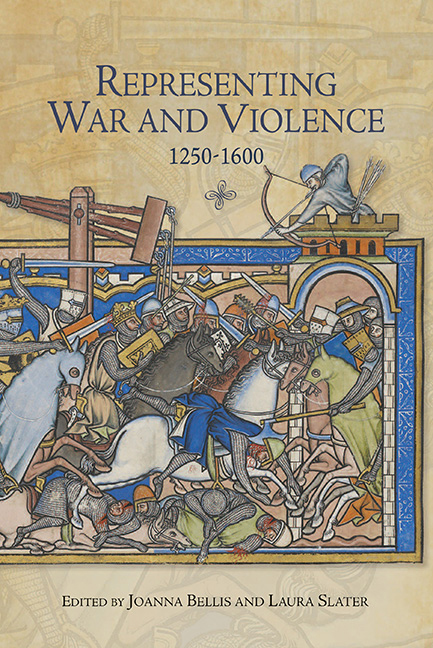Book contents
- Frontmatter
- Contents
- List of Illustrations
- Acknowledgements
- List of Contributors
- Introduction: ‘Representation’ and Medieval Mediations of Violence
- Part I The Ethics and Aesthetics of Depicting War and Violence
- Part II Debating and Narrating Violence
- Part III Experiencing, Representing and Remembering Violence
- 7 Representing War and Conquest, 1415–1429: the Evidence of College of Arms Manuscript M9
- 8 Tudor Soldier-Authors and the Art of Military Autobiography
- 9 Three Narratives of the Fall of Calais in 1558: Explaining Defeat in Tudor England
- Bibliography
- Index
8 - Tudor Soldier-Authors and the Art of Military Autobiography
from Part III - Experiencing, Representing and Remembering Violence
Published online by Cambridge University Press: 05 September 2016
- Frontmatter
- Contents
- List of Illustrations
- Acknowledgements
- List of Contributors
- Introduction: ‘Representation’ and Medieval Mediations of Violence
- Part I The Ethics and Aesthetics of Depicting War and Violence
- Part II Debating and Narrating Violence
- Part III Experiencing, Representing and Remembering Violence
- 7 Representing War and Conquest, 1415–1429: the Evidence of College of Arms Manuscript M9
- 8 Tudor Soldier-Authors and the Art of Military Autobiography
- 9 Three Narratives of the Fall of Calais in 1558: Explaining Defeat in Tudor England
- Bibliography
- Index
Summary
Throughout the Tudor period English and Welsh soldiers fought extensively in military expeditions in Scotland, Ireland, France and the Low Countries. But until relatively recently the received narrative concerning the degree to which England experienced any sort of significant ‘military revolution’ during the sixteenth century maintained that the nation lagged behind the more militarised countries of continental Europe in both the theory and practice of war. Such a view continues to influence the ways in which historians and critics treat English contributions to what became a substantial literature on the art of war, a vast body of writing in manuscript and print that explored every facet of the logistics, strategies, technology and legality of war. Nearly 200 military books were printed in England during the sixteenth century penned by serving and ex-soldiers, polemicists and scholars of practical disciplines with battlefield applications (like geometry and surgery). Military autobiography – a term grappled with in a moment – formed a modest though nevertheless significant and revealing sub-set of Tudor martial writing. Charles Oman made a prefatory comment in his classic History of the Art of War in the Sixteenth Century about the perceived lack of ‘any autobiographical record by English military men, till we have arrived at the very end of the Tudor period, when material begins to become abundant from Francis Vere and his less-remembered contemporaries’. Much has been written on French, German and Spanish martial life-writing, most notably Yuval Harari's 2004 monograph on early modern military memoirs, though very little has been said to date about material from the British Isles. The present article endeavours to remedy this and, indeed, will challenge Oman's negative claims about native sources. It examines – for the first time – how a range of sixteenth-century British authors represented war and reflected upon their experiences of combat, and it also looks at the different forms and opportunities of which these figures made use. After discussing the ontology of military autobiography itself, this article offers a critical survey of extant native sources written prior to that moment mentioned by Oman, when Sir Francis Vere began composing his autobiographical Commentaries (c. 1604).
- Type
- Chapter
- Information
- Representing War and Violence, 1250-1600 , pp. 159 - 177Publisher: Boydell & BrewerPrint publication year: 2016



